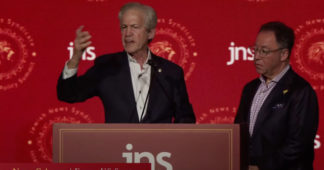By Omar Zahzah*
Jul 1, 2025
The Instagram account of a well known anti-Zionist Jewish comedian was deleted after Meta’s Public Policy Director for Israel and the Jewish Diaspora viewed one of his stories. This is just one example of the anti-Palestinian bias across Big Tech.
On Tuesday, May 27, 2025, Meta permanently deleted the Instagram account of anti-Zionist Jewish comedian Michael Schirtzer. According to Schirtzer, who provided screenshots to Mondoweiss for verification, the takedown happened after one of his stories was viewed by Jordana Cutler, Meta’s Public Policy Director for Israel and the Jewish Diaspora.
The video in question showed Israeli audience members walking out on one of Schirtzer’s shows as he told a joke about how a former Israeli soldier from the 8207 battalion was eaten by a shark. The April 2025 shark attack briefly became the subject of various online jokes, many of which poked fun by connecting it to the Israeli Occupation Forces’ indiscriminate targeting of Palestinians. “The shark swam past Israeli children, but it didn’t hit the children,” Schirtzer said in the video. “So even a shark can tell the difference between a child and a soldier.”
Everyone concerned with the Palestinian liberation struggle should know Cutler’s name and role well. On Monday, April 28, 2025, Cutler spoke at the Jewish News Syndicate (JNS) International Policy Summit in Jerusalem. She explained how she had created her “new role” to include a focus on the “Jewish diaspora” alongside Israeli public policy work for Meta, effectively meaning she had forged a company position directly tasked with enforcing the false conflation between criticism of Israel and antisemitism. “We updated our policies to recognize that the term ‘Zionist’ can be used as a proxy for Jews and Israelis,” Cutler said in her remarks. In July 2024, Meta announced it was expanding its hateful conduct policy to restrict anti-Zionist speech. In October 2024, The Intercept reported that Cutler was personally pushing to censor Meta accounts of Students for Justice in Palestine by flagging them under Meta’s “Dangerous Organizations and Individuals” policy.
Facebook’s 2016 hiring of Jordana Cutler, a former adviser to Benjamin Netanyahu who has explicitly claimed to operate as “a liaison” between Facebook and the Israeli government, rests alongside the 2020 appointment of former Israeli Ministry of Justice General Director Emi Palmor to the company’s regulatory Oversight Board as crucial developments in Meta’s consolidation of an increasingly elaborate digital architecture of anti-Palestinian erasure. During her tenure at the Israeli Ministry of Justice, Palmor petitioned Facebook to censor Palestinian political speech, and the Cyber Unit established by the Ministry of Justice standardized the process of clandestinely petitioning social media companies like Facebook to take down Palestinian content, much to the alarm of human rights organizations and Palestinian Civil Society organizations.
‘Meta’s direct link to the Israeli occupation’
Cutler, Schirtzer told me over the phone, “is Meta’s direct link to the Israeli occupation, tasked with enforcing censorship.” It is for this reason that, as he writes on Substack, “I knew the moment I saw Jordana Cutler’s profile view my stories, it was only a matter of time. I said to close friends Meta was going to take down my account without any option to appeal, any content warning, without any violation.” He described the feeling to me as “like I was going down on the Titanic. I knew it was over.”
I reached out to Meta to follow up about Schirtzer’s account as well as the struggles around pro-Palestine speech Irish comedian Tadhg Hickey has been facing on Instagram (more on this below). A Meta spokesperson sent the following statement in response: “It is dangerous and irresponsible to single out an individual employee, especially as this deliberately misrepresents how our processes work: who flags a particular piece of content for review is irrelevant because our policies govern what is and isn’t allowed on platform. With respect to these accounts, their content consisted of extreme policy violations, and our actions had nothing to do with who flagged it.” The company also maintains that it makes decisions based on whether or not content violates policy, not individual beliefs, and that the Content Policy Team that writes the policies regarding permissible content is separate from the Global Policy Team, whose work is to consult with policymakers and government representatives.
“Policy” seems to be a sticking point for Meta. Both in my exchange with the company as well as the Intercept’s reporting on Cutler, representatives repeatedly defaulted to accusations that critical reporting was not taking the plurality of Meta’s division of labor into account. But this is just technocratic gaslighting: scores of rights organizations continue to identify an anti-Palestinian bent to Meta’s moderation policies. And framing a standard universally doesn’t mean that the standard will be universally applied. Due to orientalist and racist stereotypes, Palestinian speech (or content related to Palestine) is far less likely to be perceived as “neutral” from the outset. Corporate silos don’t innoculate from culturally ingrained bias. In fact, as in Meta’s case, they may fortify that bias with misleading assurances about “independent” conclusions. But it doesn’t really matter if it’s one team or several “independent” ones repeatedly arriving at findings that make it more difficult, if not impossible, for Palestinians and their allies to use Meta platforms, including hyper-policing Palestinian content while systematically ignoring Zionist incitement.
On a very shrewd level, Meta may be right that Jordana Cutler doesn’t have sole jurisdiction over the viability of content permanence on Meta platforms. But the appointment of an Israeli government-linked official who has repeatedly bragged that she is enforcing the settler-colonial apartheid state’s best interests — to the point that her own colleagues have decried the double-standard — represents the company’s clear disregard for Palestinians. Regardless of so-called team distinctions, it strains credulity to believe that Cutler viewing content about Palestinian liberation is irrelevant to that content’s lifespan on Meta platforms.
Ongoing repression
This is not the first time Schirtzer has faced repression on Meta platforms. In addition to being a stand-up comedian, Schirtzer co-hosts the podcast The Palestine Pod along with Palestinian American attorney Lara Elborno. On March 8, 2022, Meta deleted The Palestine Pod Instagram account. The account was restored with no explanation after Elborno and Schirtzer consulted with Palestine Legal and launched a social media campaign along with allies. Meta provided vague and irrelevant explanations for the deletion, and also removed the account’s followers, as well as periodically deleting posts on Elborno’s personal Instagram account.
Episode 48 of the Palestine Pod was dedicated to this temporary deletion and featured Within Our Lifetime (WOL) Chair Nerdeen Kiswani as a guest. At the time the episode was uploaded (March 16, 2022,) WOL was also battling removal of Instagram posts and a temporary deletion of its account. In February 2024, Meta permanently banned both the WOL account and Kiswani’s personal account from Instagram. But as Elborno observed in Episode 48, it’s about far more than the literal bans. Meta’s expansive, increasingly formalized, and unpredictable censoriousness makes its platforms unreliable for Palestinians and their allies. “We’ve never actually violated the terms that they say we are guilty of violating, but our accounts are constantly being threatened. And that’s really the message here,” Elborno said.
Just over four months later, Meta enabled a coordinated, cash-for harassment campaign launched against Elborno, Schirtzer, and The Palestine Pod by the Zionist organization JewBelong. Antisemitism was falsely weaponized to mean simply “criticism of Israel” and subvert the optics of harassment, so that the perpetrators (JewBelong and its paid trolls) became the victims, while the victims themselves, a Palestinian and an anti-Zionist Jew, were gaslit by Meta, whose representatives claimed to see nothing amiss or afoul of their so-called “community standards” with organizations paying followers to harass them on the company’s platform.
The deletion of Schirtzer’s Instagram account is clearly just the latest chapter in a saga of repression by a company that has intentionally fashioned itself into an enemy of Palestinian identity and expression. I use the term digital settler colonialism to refer to how Big Tech companies reinforce Zionist settler colonialism through practices, including targeted censorship of Palestine-focused expression. It is clear that this trend, which first reached explicit global awareness following the Sheikh Jarrah uprisings of 2021, has grown even more blatant following Israel’s latest genocide of Palestinians in Gaza.
YouTube’s ‘hateful speech’ class
“I just want to say to our tech overlords, first and foremost, I’m so sorry… for sticking up for Palestinian human rights. That was wrong of me. That was quite extremist of me, actually, and sick,” Irish comedian Tadhg Hickey jokes in a satirical May 27 video about how opposing the genocide and criticizing Zionism led to Instagram and TikTok bans as well as permanent demonetization on YouTube. “It’s just an ongoing shitshow when you’re pro-Palestinian online,” Hickey said during an interview with Mondoweiss. “There’s just restrictions left, right, and center.”
Hickey detailed facing myriad digital hurdles for his particular brand of conscious comedy, from content strikes for non-applicable charges such as nudity and solicitation on Palestine-related material to being demonetized and continuously banned from going Live on Instagram. YouTube demonetized Hickey’s account for a satirical video that referenced Hamas. The video was removed, found to be in violation of YouTube’s guidelines, and Hickey was asked by YouTube to take a course on “hateful speech” as a prerequisite for potentially regaining the ability to monetize. Hickey described the test as an “exam meant to help me not to endorse hateful organizations. It was about five minutes long, and it was multiple choice: ‘If you were to say this, would that be wrong?’” In addition to being “gutted” that he didn’t record the exam “for satirical purposes,” Hickey said that he believes the exam showed YouTube to be “placing itself as a moral paragon for proscribed groups going forward — even though there’s loads of sketches about ISIS, the IRA [Irish Republican Army] — that’s fine, it’s just Palestinian resistance groups that are completely a no-no. Satire is art, not a declaration of intent.”
Hickey’s Instagram account was restored on June 6. But as lawyer and podcaster Lara Elborno noted above, it’s the constantly embattled nature of being pro-Palestine online that is the real issue. “I’m very aware, and I expect that the Big Tech overlords will put the thumbs down to me again very soon, and I could easily be off all these platforms,” Hickey said. He also emphasized how tech suppression exacerbates the difficulty that professional comedians with dissenting views, such as himself, already face being platformed on more mainstream media outlets or entertainment venues.
The digital bans of Hickey and Schirtzer invite reflections on how comedy can play an important and unique role in challenging power. Humor can redistribute agency by mobilizing popular scrutiny through laughter, unsettling the unquestioned reverence authority often presumes. “Smug, greedy, well-fed white people have invented a language to conceal their sins, it’s as simple as that,” George Carlin, a comedian whom Michael Schirtzer considers a great influence, once mused in a famous bit: “The CIA doesn’t kill anybody anymore, they neutralize people. Or they depopulate the area. The government doesn’t lie, it engages in disinformation. The Pentagon measures nuclear radiation in something it calls sunshine units. Israeli murderers are called commandos; Arab commandos are called terrorists.”
Tadhg Hickey described his vision of being a comedian to me as follows: “My job as a satirist is to lampoon or challenge authority. That’s the tradition of satire that I grew up in and the satirists that I admire. Going all the way back to people like Jonathan Swift in Ireland, it was always about punching up. So I don’t know a better time in the history of the world to be punching up at authority, be it Western governments, Western media, the Israel lobby — these are all my targets. So I just think it’s interesting the way that I have been really targeted [even though my content] is predominantly satire. I do think there’s something really interesting about the way that satire, which I consider to be an art form, art itself, is under unprecedented censorship, which feels a bit like fascist Europe of the ‘30s. Anything that’s in any way sending up or lampooning the empire needs to be completely silenced.”
‘You first’
Of course, the colonial digital dragnet has caught more than comedians, and seems to be operating regardless of social clout. On May 25, 2025, Twitch banned popular streamer Hasan Piker for discussing the motives of Israeli embassy staff shooter Elias Rodriguez. In a post on X, Piker wrote, “Twitch tos [Terms of Service] dictates a suspension for even critical examination of [Rodriguez’s] manifesto. I believe this is a bad policy for news and press freedom.” Like Meta, the Amazon-owned streaming platform Twitch updated its hateful conduct policies to prohibit criticisms of Zionism on November 15, 2024. As Bärí A. Williams observes about corporate disregard for racial justice in the tech world: “Silicon Valley is a big game of ‘you first.’” I believe this principle also holds true for Palestine: larger platforms normalizing anti-Palestinian censorship inspire others to follow suit. And the biggest victims are Palestinians resisting settler colonialism and genocide.
Comedians that Schirtzer has performed with have told him that they received “90%” of their information about Palestine from his account. Having such an impact felt important in the world of comedy, where “the easy money’s in staying quiet.” And Schirtzer found that social media not only enables geographic interconnection, but it also facilitates our abilities to make political connections across global anti-colonial struggles. The potential use of digital platforms for these processes of education and empowerment is why Schirtzer feels it’s crucial not to underestimate Jordana Cutler’s role in the colonial process. “She is the Joseph Goebbels of our time,” Schirtzer told me. “She’s the Minister of Information in the modern-day context, a crucial cog in the machine that allows this genocidal infrastructure to run. She decides what we can and can’t see. And if it weren’t for her, content promoting Palestinian human rights and liberation would have reached a lot more people, and inspired more people to take action.”
Yet while Schirtzer is incensed, he does not despair.
“It’s an honor to have sacrificed something for Palestine,” he told me. “Zionists have tried to get me banned from the hot clubs in LA. The joke’s on them — I’m already not getting booked there. Now they’ve come after me on Instagram. It’s not going to silence me. Free Palestine.”
UPDATE: As of 7:41am PT on July 2, 2025, Schirtzer received a notification saying that Meta had disabled the new Instagram account he made following the May 27th deletion of his original account. He had just uploaded this video to TikTok regarding the censorship, and collaborated with Tadhg and several other Palestinian accounts. In a follow up comment to Mondoweiss Schirtzer said: “The executives at meta were clearly triggered by this single article in independent media. Never underestimate the power of your own voice. Also the best way to dispel allegations of an abuse of power is to disappear the accounts of dissenting voices once again less than 24 hours after publication.”
We remind our readers that publication of articles on our site does not mean that we agree with what is written. Our policy is to publish anything which we consider of interest, so as to assist our readers in forming their opinions. Sometimes we even publish articles with which we totally disagree, since we believe it is important for our readers to be informed on as wide a spectrum of views as possible.











